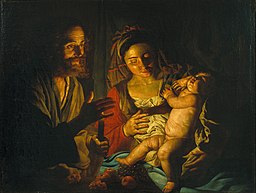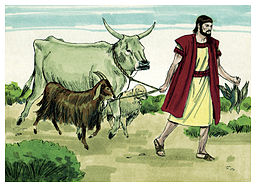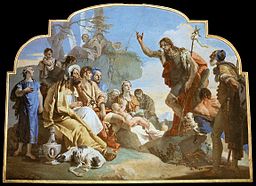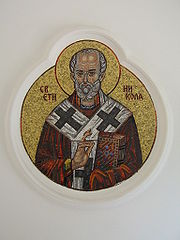Greater Freedom
Holy Family C (30 Dec 2012)
Homily of Fr. Paul Panaretos, S.J.
In 2012 “Spend More Time with Family” was 10th of the top 10 New Year’s Resolutions. The other nine involved health, helping others, falling in love, saving money and getting organized.1 I began to think, Did people make resolutions about faith—learning and living it? This Year of Faith suggests I ask us to consider resolving to deepen faith in practical ways. First a word about faith, then about living it.
Christian faith is essentially this: a relationship with the Trinity. As a relationship it is a mystery. Not a whodunnit to solve it is to live, as relationships of spouses, of siblings, of friends, of brother- and sister-parishioners. No one completely knows another. Even a person with intimate knowledge of another does not enjoy total knowledge. That is why spouses and siblings as well as longtime friends surprise one another. Our surprise is knowing others better, knowing them in new light.
A shining feature of knowing another as spouse, sibling, friend, brother- or sister-parishioner is trust. Family members entrust themselves to one another as family. Friends entrust themselves as friends. Parishioners entrust themselves as members in and sharers of Messiah Jesus’ body. We have experienced all these relationships; our trust has been confirmed, and it has been wounded.
With our experience wounded we may be hesitant to surrender ourselves to our triune God, not to mention to other people. To put it in other words: we are challenged to live our faith. With our experience confirmed we dare to surrender ourselves to our triune God. To put it in other words: we are willing to live our faith. Our triune God is not with us in the same way as we are with one another. Jesus embodied God, which we celebrate with focused attention at Christmas. Now, Jesus is even closer because he lives with us in, through and by his Holy Spirit. If the apostles trusted Jesus when he walked with them, you and I are called to trust Jesus with a greater trust. As St. John reminded us, the way we know that [Messiah Jesus] abides in us is from the Spirit he gave us.
We cannot reduce Spirit-knowing to our other ways of knowing. Spirit-knowing overlaps with human knowing. Spirit-knowing also exceeds human knowing. Intuition may not be a bad analogy. When a parent senses something is not all right with a child; when a sibling senses a sister is going to announce her intention to marry; when a friend senses a friend is anguishing over an important choice: when people have no solid evidence for such things yet feel in their bones the distress or elation facing another, they operate on a different though real knowledge.
Surrendering to our triune God operates that way. We may not be able to prove it in court, even the court of public opinion, yet we trust in God even when appearances suggest other-wise. Because faith-relationship works that way we need models. On Holy Family
Sunday it is an understatement to remind ourselves that children need parents and other elders to guide them in all ways, especially the ways of faith. Abraham modeled for all that faith is an attitude of confident trust. St. Paul echoed Abraham’s story to the first generation of Christians.2 Faith empowered Abraham,3 and because it did faith was gift not something Abraham manufactured. He did cultivate what empowered him, and he lived from his relationship with God. Heartfelt compassion, kindness, humility, gentleness, and patience, bearing with one another and forgiving one another describe relationship in practice.
Sunday it is an understatement to remind ourselves that children need parents and other elders to guide them in all ways, especially the ways of faith. Abraham modeled for all that faith is an attitude of confident trust. St. Paul echoed Abraham’s story to the first generation of Christians.2 Faith empowered Abraham,3 and because it did faith was gift not something Abraham manufactured. He did cultivate what empowered him, and he lived from his relationship with God. Heartfelt compassion, kindness, humility, gentleness, and patience, bearing with one another and forgiving one another describe relationship in practice.
Continue cultivating your faith. Make a resolution to practice our faith with more energy and in concrete ways. Resolve in a way that will help you put your faith in action: it may be resolving as a family; it may be resolving in a modest way so your resolution is not a contest but a desire to surrender to the mystery of divine life creating you. It may involve a return to a practice; it may mean beginning a new practice. Whatever you resolve, revisit it in a couple months. If you experience God in Jesus by their Spirit in a new way, it will be because you surrendered to our Creator instead of struggling to create things in your image. That temptation always fraught with frustration. Practicing faith leads to increased freedom.
In your daily 15 minutes with Jesus this week
- Rest in the Trinity, who create you each moment.
- Ask Mary and Joseph to present you to Jesus.
- Chat with Jesus: praise him for becoming human for you and abiding with you by his Spirit; share with him what keeps you from giving yourself into his care.
- Ask Jesus for grace to surrender with greater confidence to him as your savior, your brother, your friend.
- Close saying slowly the Lord’s Prayer. Its opening words, Our Father, shift us from thinking we are the center of the universe. The words remind us our Creator and Redeemer is its center. We are the crown of creation, not its center.
Link to this homily’s Spiritual Exercise
____________
- Stastic Brain webpage.
- Genesis 15:6; Romans 4:3, 9-22; Galatians 3.6-7; Also James 2:23.
- Romans 9.20.
________________________________________________________________
Wiki-image of the Holy Family is in the public domain in the U.S. Wiki-image by Distant Shores Media/Sweet Publishing of Abraham empowered by faith used by CC BY-SA 3.0.



















